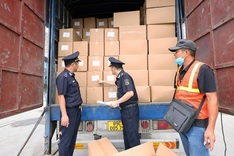
Soyabeans are among key agricultural items Vietnam imports from the United States. (Photo:mekongasean.vn)
A delegation of nearly 50 representatives from Vietnamese agencies, businesses, and agricultural associations is travelling to the United States to seek trade promotion opportunities and boost imports of key US agricultural products from June 1 - 7.
They are seeking to import key US agricultural products such as animal feed ingredients, fertilisers, biological pesticides, chilled meat and seafood, and timber materials.
The working visit of the delegation led by Minister of Agriculture and Environment Do Duc Duy is to reinforce the Vietnam - US Comprehensive Strategic Partnership toward balancing trade exchanges between the two countries.
Duy emphasised that both countries are strong in agriculture but are not direct competitors, and instead, they complement each other. The two sides are working together to build shared supply chains, enhance competitiveness, and ensure benefits for both producers and consumers.
Vietnamese businesses expect the trip will not only open up import opportunities but also provide access to advanced US technologies and solutions to increase the value of domestic agricultural production chains.
The working visit comes following a Vietnam trip in September 2024 by the largest-ever US agricultural trade mission led by USDA Under-secretary Alexis Taylor visited Hanoi. It included representatives from 9 states, 35 companies, and 25 agricultural associations, demonstrating America’s strong interest in the Vietnamese market.
American consumers have shown strong demand for Vietnamese agricultural products like spices, fruits, seafood, as well as wooden furniture. Conversely, Vietnam has a high demand for quality US agricultural inputs such as soybeans, corn gluten meal, milk, seeds, livestock equipment, and timber.
Vietnam’s agricultural sector is becoming increasingly professional and modern, open to new technologies. Since 2020, Vietnamese companies have signed 18 memorandums of understanding (MoUs) to import US agro-forestry-fishery products worth a total of US$6 billion, of which US$3 billion has already been disbursed.
The government of Vietnam has also facilitated US market access. To date, 509 US meat exporters and 232 seafood exporters have been licensed to export to Vietnam. In addition, Vietnam is one of only eight Asian countries to approve all 61 US dossiers for genetically modified crops.
The Government’s Decree 73/2025/ND-CP, issued on March 31, 2025, further supports market opening by reducing import tariffs to 0% for many US agro-forestry-fishery products. As a result, agricultural trade between the two countries has maintained stable growth of around 10% annually for the past decade.
However, a recent decision by the Trump administration to impose a 10% tariff starting April 2, 2025 with a potential increase to 46% from July 9 on Vietnamese exports to the US has raised serious concerns.
According to Dr. Nguyen Do Anh Tuan, director general of the International Cooperation Department under the Ministry of Agriculture and Environment, these tariffs would erode profits and reduce the competitiveness of businesses from both sides. Most notably, they would impact American consumers, particularly low-income households, who rely heavily on essential Vietnamese products like rice, seafood, and fruit.
Dr. Tuan warned that such retaliatory tariff measures could disrupt the agricultural supply chains that both countries have worked hard to build, ultimately harming both businesses and citizens of the two economies.
Meanwhile, a USDA representative affirmed that any agricultural trade imbalance largely depends on specific sectors and is influenced by factors such as regulatory policies, consumer demand, and supply chain dynamics. Ensuring equal market access and reducing tariffs remain top priorities for sustaining long-term trade growth.
The US visit by the Vietnamese delegation this time therefore demonstrates Vietnam’s goodwill toward promoting strategic trust within the bilateral agro-forestry-fishery supply chain. It also further strengthens the Comprehensive Strategic Partnership on the occasion of the 30th anniversary of diplomatic relations between the two countries.




















